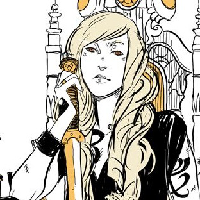Dmitri "Mitya" Karamazov type de personnalité MBTI
Personnalité
"Quel type de personnalité est Dmitri "Mitya" Karamazov? Dmitri "Mitya" Karamazov est un type de personnalité ESFP dans MBTI, 8w7 - SX8 - 827 dans Enneagram, SLUAN dans Big 5, SEE dans Socionics."
Naranjo, C. (2019). "Dramatis personae: Eneatipos, cine y literatura" "One of the most famous literary incarnations of this human type is the one we find in Dostoyevsky’s the elder of “The Karamazov Brothers”: the intense Dmitri, a Dionysian who, just because of his lust, attracts both the criticism of those around him and the sympathy of those who read his story. His bad reputation and the suspicion that he inspires reach so much that when his father is murdered, he is unfairly considered responsible, and at the end of the novel he is sent as a prisoner to Siberia. The truth of the story that Dostoyevsky tells in his novel is that the crime was committed by an epileptic servant of his father, whom no one suspects because of his illness and his apparent idiocy, and also, indirectly, by Ivan Karamazov, the most intellectual of the brothers, since the servant who commits the crime deeply admires him and believes, through the murder, that he is serving Ivan by acting according to his way of thinking and feeling. As much as Ivan, despite his disapproval of his father, has never been coherent enough to translate his thought into action, it is quite natural for those investigating the murder to assume that the most violent of old Karamazov's sons (that he had money conflicts with him over the years and that once, in a fit of rage, he had threatened to kill him) was responsible for a patricide that he would not have committed, since Dmitri, despite being violent, he is also a kind-hearted person—and much more loving than his brother Ivan. The conjunction of a violent, possessive, and dominating character in Dmitri with a noble humanity can be appreciated in one of the central episodes of the novel, which occurs when he is serving in a regiment. The main characteristic of this type of lecher, which is not simply a thirst for intensity, but a vengeful will to dominate, and an ability to seize the other in order to humiliate him. Regarding Dmitri's personality, the most important understanding that the end of the novel gives us is that, despite his innocence and the enormous weight of his unjust sentence of exile in Siberia, his reaction is to accept such punishment as an opportunity to redemption; and not of a redemption with respect to public opinion, but of his acute awareness of the monstrosity that his lustful and vengeful character signifies. Despite the very different personalities of Raskolnikov in “Crime and Punishment” and of Dmitri in “The Brothers Karamazov,” both end up in the same way: with a sentence that they understand as the first step towards purification and a new life."
Biographie
Personnalité correlate

Alexei "Alyosha" Karamazov

Ivan Karamazov

Fyodor Pavlovich Karamazov

Pavel Smerdyakov

Father Zosima

Agrafena Svetlova (Grushenka)

Nikolay 'Kolya' Krassotkin

Liza "Lise" Khokhlakova















